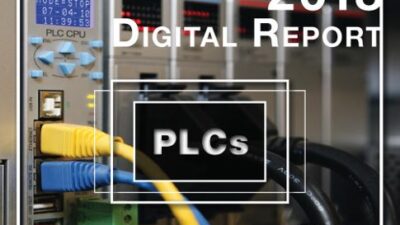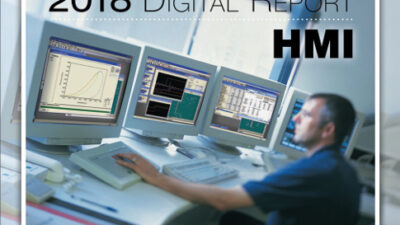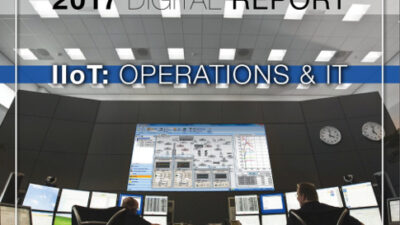Controllers can be studied in ISA’s fourth edition of its popular book; they can be viewed this week at the STEP numerical control demo in East Hartford, CT; and will be discussed in a series of presentations at ISA Expo on Oct. 16.
Controllers can be studied in ISA’s fourth edition of its popular book; they can be viewed this week at the STEP numerical control demo in East Hartford, CT; and will be discussed in a series of presentations at ISA Expo on Oct. 16. All phases of programmable controller applications from systems design and programming to installation, maintenance, and start-up are discussed in Programmable Controllers, 4th Edition , by Thomas A. Hughes discusses . Used as a resource by technicians and engineers, the applications-based book provides a clear presentation of fundamental principles of programmable controllers for process and machine control, increased coverage of all five standard PLC programming languages, plus programming applications and examples explaining each language.Since 1989, the book has been used as a text for PLC courses and for self-study by professionals. The material includes chapters on binary logic fundamentals, electrical and electronic principles, input and output systems, memory and addressing, programming languages, and data communication. Chapter 11 provides complete coverage of typical PLC control applications. The final chapter covers design, installation, and maintenance of programmable controllers. Chapters have been supplemented with new or improved example problems and exercises. Most illustrations have been revised and improved. A STEP-NC demonstration event set for Oct. 1-2, 2008, in Connecticut. The STEP Manufacturing team (ISO TC184 SC4 WG3 T24) will meet at the Connecticut Center for Advanced Technology Inc. (CCAT), in East Hartford, Oct. 1 to 2, 2008, to demonstrate and discuss advanced uses of the STEP-NC AP238 standard.The standard is the result of a 10-year international effort to replace RS274D (ISO 6983) M and G code standard with a modern associative language that connects CAD data to determine machining requirements for an operation with CAM data that solves those requirements. STEP-NC builds on the previous effort to develop the STEP neutral data standard for CAD data, and uses the modern geometric constructs in that standard to define device-independent tool paths and CAM-independent volume removal features.The ISO team will demonstrate advantages of STEP-NC for closed-loop machining applications. An impeller will be machined in a titanium alloy and measured in process using an articulated arm and offline using a coordinate measuring machine (CMM) machine. The demonstration will show:• Feeds and speeds can be adjusted on the machine to meet the latest manufacturing schedule while minimizing tool wear;• Surface measurements can be taken using robot arms, gages, and probes and used to adjust tool-path geometries for extra accuracy during finish machining; and• Complete models of the product and process enable real-time simulation and error-checking for first-part-correct machining.The first day of the meeting will take place at CCAT and United Technologies Research Center (UTRC) facilities on the Pratt and Whitney campus in East Hartford. It will feature the machining and measurement of the impeller part, beginning with an introduction to the STEP-NC concept by machining experts, followed by closed-loop, five-axis machining of the impeller in a titanium alloy, with in-process measurement using an articulated arm and offline using a scanning CMM.The day will conclude with a panel discussion by representatives from Boeing, CCAT, Sandvik, Mitutoyo, STEP Tools , and the U.S. National Institute of Standards and Technology (NIST).The second day will take place in the CCAT meeting facilities. The technical agenda features the latest enhancements proposed to make machining more efficient, accurate, and flexible, with proposals for dynamic feed and speed optimization that will be finalized at the meeting. New proposals for computing and correcting tool-paths will be discussed, as well as discussions on new standards for machine tool simulation and cutting tool data exchange. A PLC panel convenes at ISA Expo in Houston at noon on Thursday, Oct. 16. Trails and Trends in Programmable Controls, moderated by Ken Ball, covers advances in digital technology along with pressures to improve manufacturing productivities that contributed to a meteoric growth of the PLC industry. Evolving PLC relationships and synergies with other automation technologies, such as motor drives and motion control, CNC, robotics, automatic ID, and wireless, will be reviewed. Trends in applying newer MEMS-based programmable devices will be discussed. Strong audience participation is encouraged.Presenters include:• Dick Morley, originator of the PLC, co-founder of Modicon, and advanced manufacturing consultant;• Bill Fletcher, first president of Modicon, who previously headed Bolt, Baranek & Newman computer research operations and later founded and headed Termiflex;• Jeff Jervah, OEM business development manager, Schneider/Square D, who was closelyinvolved with user needs and automation technology advances in the areas of drives, motion control, and safety equipment;• Kelvin Erickson, professor of electrical and computer engineering at University of Missouri-Rolla, who is an automation consultant with prior industrial experience at Fisher Controls and the author of the 1,400-page text Programmable Logic Controllers ; and• Terry Divelbiss, CEO and founder of Divelbiss Corp., manufacturer of PLCs and customized controls, and a developer of the PLC-on-a-Chip and certified surface-mount board producer.Also read:
PLC: 40th Anniversary How Programmable Logic Controllers Emerged from Industry Needs
.
— Control Engineering News Desk Register here and scroll down to select your choice of free eNewsletters .


